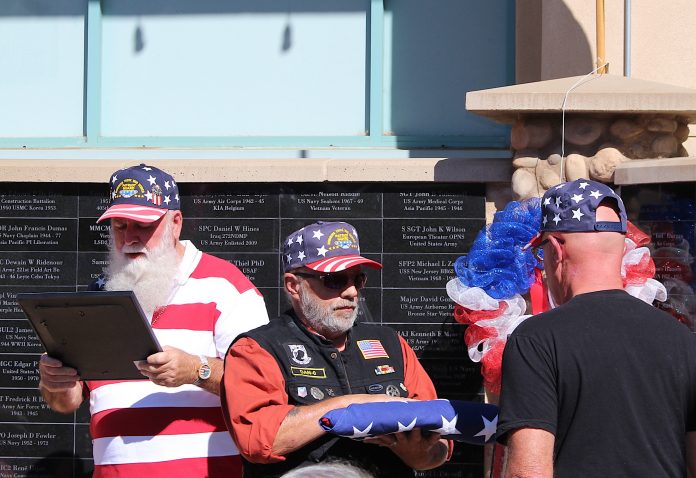Last Wednesday, Veteran Dan Foster held a memorial service for Army Sgt. Joseph Perry at the Wall of Honor, thirteen years to the date on which Perry was killed in action: Oct. 2, 2006.
Alpine Community Center Director of Operations Shane Greer attended the event not as an official, but as Perry’s best friend. He described Perry as a hero from day one, a little boy who would have toy soldiers waiting at sleepovers, always ready to save their hometown from invisible bad guys that only they could see or defeat.
“Of course, when 9/11 happened, he immediately signed up because that’s what he was put here to do,” Greer said.
Perry certainly isn’t the only person to have passed in military action, but he is something of a symbol to Alpine, a true local kid who grew up attending Alpine Elementary school and Joan MacQueen Middle school. His mother, Kirsten Yuhl-Torres described him as a kid who grew up playing on soccer teams and participating in Alpine Little League, later working in the Teen program at the Alpine Community Center.
Perry was not quite 18 when the Sept. 11 terrorist attacks occurred in the United States but he was old enough to hear a personal call demanding that he take action and he decided he would join the Army after finishing at Granite Hills High school, his delayed entry paperwork in place before he even graduated.
He was on his second deployment to Iraq and had only a few weeks left before coming home to Alpine when he was killed, shot by a sniper in Baghdad, Iraq.
Although Foster oversees new names added to the Wall of Honor each Veterans and Memorial Day, Wednesday’s presentation was held by Foster solely in honor of Perry, dedicated to his parents, Kirsten Yuhl-Torres and Vern Torres. Foster said after he found out the anniversary of Perry’s passing was approaching, he decided to hold the event and get the community involved.
At the remembrance event, Greer shared an old college paper, written after Perry’s death, for which he decided to interview Yuhl-Torres as if he were an outsider rather than someone who considered her a second mom growing up. In the paper, Greer describes a memorial wall Yuhl-Torres has set up in her home, decorated with shiny medals earned by Perry: two Bronze Stars, one with Valor, and a Purple Heart.
Greer specifically mentions one item that stood out to him on the wall as it was neither shiny nor clean. Perry’s mother tells him that it is her son’s Military Police badge, still crusted with blood from the day he was shot.
Perry was her only child.
According to Yuhl-Torres, she learned that her son’s captain stood guard at the military hospital door and insisted that she be the one to clean the young man before his body was shipped home. She says that the grim task was completed by a military officer, but the actions themselves were those of a mother.
Listening to Yuhl-Torres describe the items on her memorial wall, Greer realized it was not a wall of sadness but a mother’s shrine and described it as a source of hope in his paper.
“There in front of me sat not just the mother of a fallen hero, but a hero herself,” Greer said.
Following Greer, Perry’s mother stood and shared her own story, scanning the listeners and catching a few eyes as she addressed the crowd, her catching voice betraying her confidence every now and again.
She described the tragedy of receiving the call about her son’s death and how, after being told she was too old for Army service and could not fill her son’s shoes, she instead took action through volunteerism, sending care packages to everyone in Perry’s unit. She began with 200 cup-of-noodles packages, one for each soldier, and quickly grew her care packages into a massive network of outreach.
At the peak of her volunteer efforts, she was spending weekends assembling hundreds of care packages filled with donated items collected from area schools, soccer clubs, Girl Scouts and hundreds of personal donors to be sent overseas as well as for disbursement at local veterans’ facilities. She set up tables with items to share at hospital units dedicated to amputees and homeless shelters serving veterans.
The hard part, she says, was not the work of keeping everything going and assembling all the care packages, but watching the donations trickle off until she finally had to accept, in 2011, that it was time to put aside her volunteerism and grieve for the death of her son.
“In every tragedy, the seeds of a miracle are planted,” Yuhl- Torres said.
She finished her speech by telling the attendees they are all miracles and that life goes on,
“We love our community… and we want to make sure we never forget… God bless you for saving our country,” Foster said.













